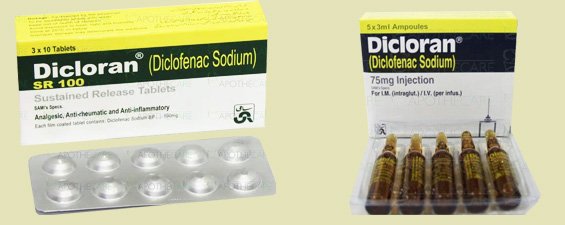Dicloran Tablets (Diclofenac Sodium) is a non-steroidal anti-inflammatory drug (NSAID) that exhibits anti-inflammatory, analgesic and anti-pyretic properties. It inhibits prostaglandins synthesis by decreasing the activity of the enzyme, cyclooxygenase, which results in decreased formation of prostaglandin precursors.
Dicloran (Diclofenac Sodium) is almost completely absorbed after oral administration. However due to first pass metabolism, only about 50% of the absorbed dose is systemically available. Food has no significant effect on the extent of the absorption Dicloran Tablets. However, there is usually a delay in the onset of absorption of 1 to 4.5 hours.
There is also a reduction in peak plasma levels. Dicloran is approximately 99% bound to human serum proteins, primarily to albumin. Dicloran is metabolized in liver and major portion of the dose is excreted in urine and the rest is excreted in the bile.
When to use Dicloran?
Dicloran is indicated for the treatment of signs & symptoms of rheumatoid arthritis, osteoarthritis, low back pain, active musculoskeletal disorders, such as peri-artheritis, tendonitis, tenosynovitis, bursitis, sprains, strains, and dislocations, relief of pain in fractures, ankylosing spondylitis, acute gout, control of pain and inflammation in orthopedic, dental and other minor surgeries. Other painful and/or inflammatory conditions like dysmenorrhoea, infections of ear, nose or throat.
When to avoid using Dicloran?
Individuals with acute & suspected peptic ulcer or gastro-intestinal bleeding and those with known hypersensitivity to Diclofenac or any other NSAID should not use Dicloran tablets, injection or Dicloran Gel.
Special Precautions
Symptoms or history of gastro-intestinal disease, asthma, impaired hepatic, cardiac or renal function NSAID may mask infections or temporarily inhibit platelet aggregation In late pregnancy, as with other NSAIDs, it should be avoided as it may cause premature closure of ductus artetiosus.
Possible Side Effects of Dicloran
Occasional gastro-intestinal disorders, headaches, dizziness, vertigo, rashes, elevation of serum transaminases, local reaction after IM injection. Rare gastric or intestinal ulcer, gastro-intestinal bleeding, abnormalities of renal function and hypersensitivity reactions.
Common Drug Interactions
When Diclofenac is administered with Aspirin (e.g. Ascard), its protein binding is reduced. As with other NSAIDs, concomitant administration of Dicloran and Asprin is not generally recommended because of the potential of increased adverse effects.
with Methotrexate, Cyclosporine
Dicloran like other NSAIDs, through effects on renal prostaglandins, may cause increase toxicity of certain drugs. Methotrexate serum levels may be elevated as well as cyclosporine nephrotoxicity
with Lithium
Diclofenac decreases lithium renal clearance and increases its plasma levels. In patients taking Dicloran and Lithium concomitantly lithium toxicity may develop.
with Diuretics
Dicloran and other NSAIDs can inhibit the activity of diuretics. Concomitant treatment with potassium sparing diuretics may be associated with increased serum potassium levels.
Recommended Dosage of Dicloran Tablets
- For the relief of osteoarthritis, the recommended dosage is 100 -150mg/day in divided doses
- For the relief of rheumatoid arthritis the recommended dose is 150 – 200mg/day in divided doses
- For the relief of ankylosing spondylitis, the recommended dose is 100mg/day in divided doses or as directed by the physician
- Dicloran Injection, a 3ml ampoule of Dicloran is usually administered once a day or as directed by the physician.

Leave A Comment